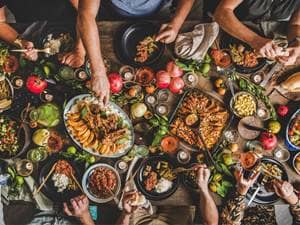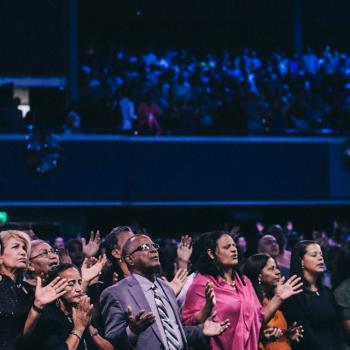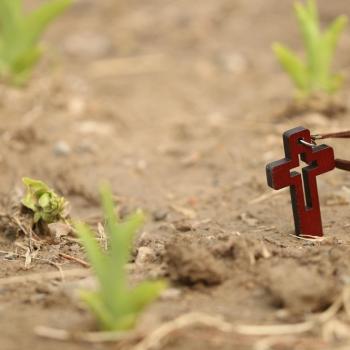
“You’d think we’d lose weight during Ramadan,” said Amina, a registered dietician who observes the Islamic month of fasting each year in Arizona, “but you’d be wrong.”
Ramadan, the ninth month of the lunar calendar, is a month of fasting for Muslims across the globe. Throughout the month, which starts this year around March 11, observers do not eat or drink from dawn to sunset.
“It sounds like a recipe for weight loss,” Amina said, “but you’d be wrong. I’ve found it’s much more common for clients — of all genders and ages — to gain weight during the season.”
The combined result of consuming fat-rich foods at night when breaking the fast (iftar), numerous celebratory gatherings with family and friends, decreased physical activity and interrupted sleep patterns means many fasters are surprised by the numbers on the scale when the festival at the end of the month (Eid al-Fitr) comes around.
Christians observing the traditional fasting period of Lent (February 14 - March 30, 2024) can also experience weight gain as they abstain from things like red meat or sweets. Despite popular “Lent diets” and conversations around getting “shredded” during the fasting season, many struggle with their weight during the penitential 40-days prior to Easter, the celebration of Jesus’ resurrection.
The convergence of the fasting seasons for two of the world’s largest religions meet this month, and people worrying about weight gain during them, got me thinking about the wider relevance of food to faith traditions — specifically how taking a deeper look at foodways might help us better understand this thing we call “religion” more broadly.
Diners, drive-ins and the divine.
From the way we procure food to the way we prepare a meal; from the way we set the table to who sits with us; from what we consume to how we eat it -- food customs and practices provide a veritable feast, as it were, about what people value and celebrate.
Or, as Sue McLaughlin, executive producer of the PBS series The Meaning of Food, put it: "Our attitudes, practices, and rituals around food are a window into our most basic beliefs about our world and ourselves."
Whether believers are feasting or fasting, sourcing food or considering the ethics of climate justice, food (or the lack thereof) plays a central role in global religious traditions.
Take Ramadan and Lent for example. As a practicing Christian with Muslim friends in different parts of the world, I’ve often taken part in both fasting traditions. I fondly remember chatting with older members of my Southern Californian Lutheran congregation at midweek soup suppers held before evening devotional services. I recall foolishly planning a waterless walking tour in the heat of a Jordanian summer with friends, only to celebrate our stupidity with a Yemeni feast (and plenty of fluids) that evening. Or, waking up in a tent in Mexico and snarfing down three packages of Little Debbie’s Honey Buns one early Easter morning after fasting from food since Maundy Thursday.
The rumble of my gut, the slick feeling of sweat on my skin, the fondness felt between friends and bonding over a fast broken are all vivid memories of religious practices’ inherently embodied nature. Rather than being about disembodied beliefs and meanings derived from texts, theologies, and the discourses around them, religion is made up of a menagerie of material things — including, and especially, food.
Food matters.
While food and foodways are diverse, the basic processes of collection, cultivation, consumption, and other related practices around them are commonly shared. Nevertheless, the choices made between what to eat, and what not to eat, are wrapped up in culturally and affectively attuned sensations, taste buds, and the combinations and contradictions of foods that speak to culture and meaning, power and knowledge.
Regarding what we call “religion,” David Freidenreich wrote that food is a, “powerful medium” for its expression and transmission; one that is intimately related to the everyday practice of discovering who we are in relation to other people, places and things. Through food and fasting from it, individuals and communities make meaning, uphold and cross boundaries and seek the divine — they also ritualize, consume and avoid what they consider pure and impure in the context of worship and the everyday.
For students of religion, paying attention to food practices allows us to attend to the material and affective ways in which religious actors navigate the complexities of identity in a diverse world. That’s because food, as one of the things that engages our bodies, is part of the constellation of stuff that comprises what David Morgan calls religion’s “the material life.”
Thus, rather than solely studying texts and traditions, students of religion would do better to observe the foods ingested and not ingested, the sighs of satisfaction or the grunts of frustration at foods offered.
Religion and the rumble of guts.
Returning to Ramadan and Lent, we can see how examining religion with a focus on food makes "it possible to identify differences in [religious actors’] life realities and appreciate the plurality of their local forms of expression.”
Specifically, it helps us humanize Muslims, Christians and others, coming to appreciate their identities in alternate, more comprehensive ways. Unfortunately, when it comes to popular understandings of religion, there is still a tendency to focus on thoughts and beliefs, symbols and meaning, rather than on every day, embodied and embedded practices and material realities.
Pushing back on the notion that religious actors are solely believing, purely pious or “angelic” beings, using food as the focus in our study of religion can help us see them instead as more than faithful fasters and feasters, but humans driven by the rumble of their guts, the smell of the calling kitchen or the cool refreshment of a fizzy drink on a summer’s eve.
So this year, as Ramadan begins, Lent continues and feasts approach for Baha’i (Nawruz, March 21), Hindus (Holi, March 25), Jews (Passover, April 22-30), Pagans (Beltane, May 1) and others, let us remember that believers are much more than that — they are complex, physical and emotional bundles — whose food and fasting practices are central to who they are and how they navigate the world around them.
3/7/2024 1:32:00 AM





